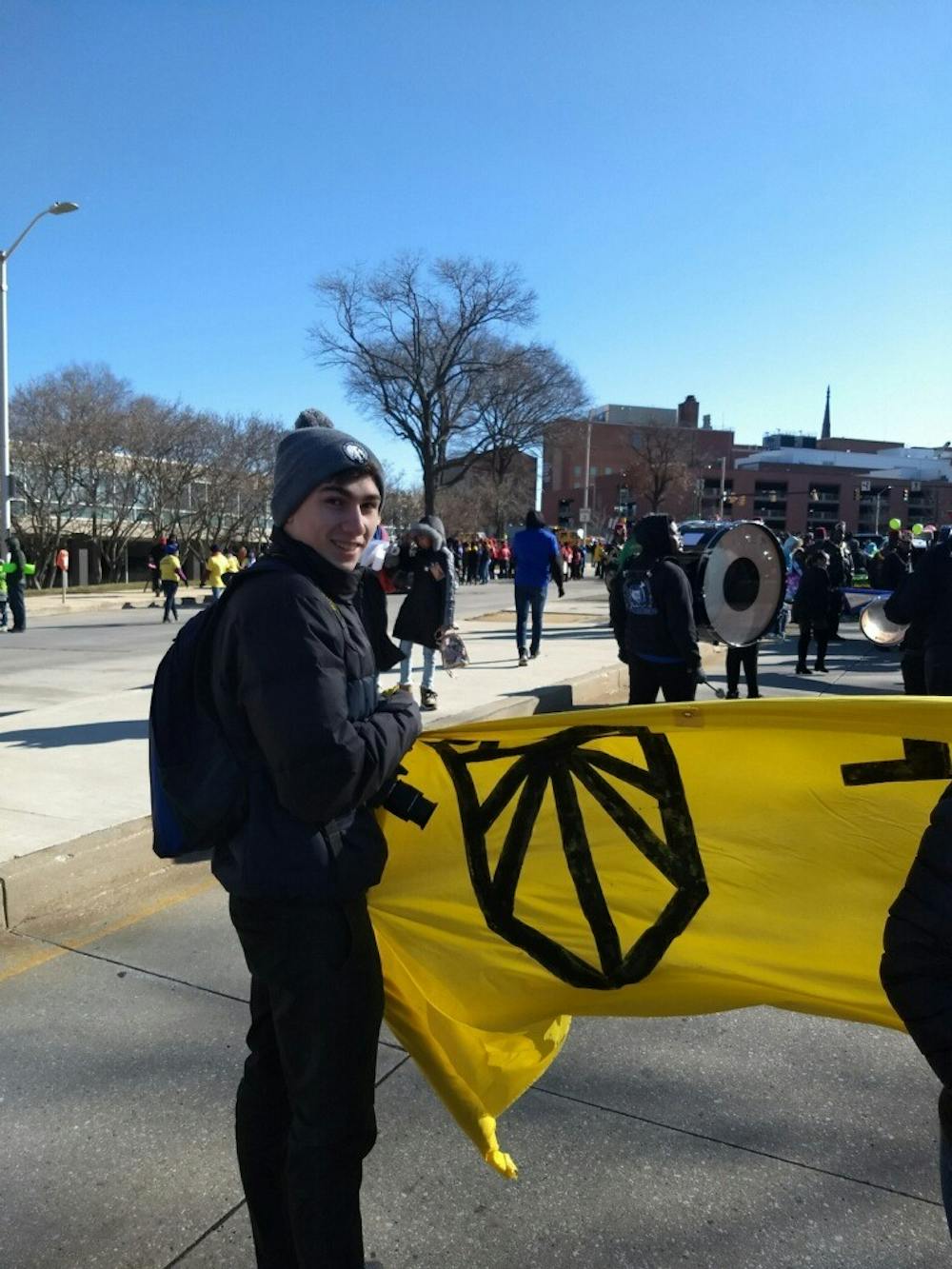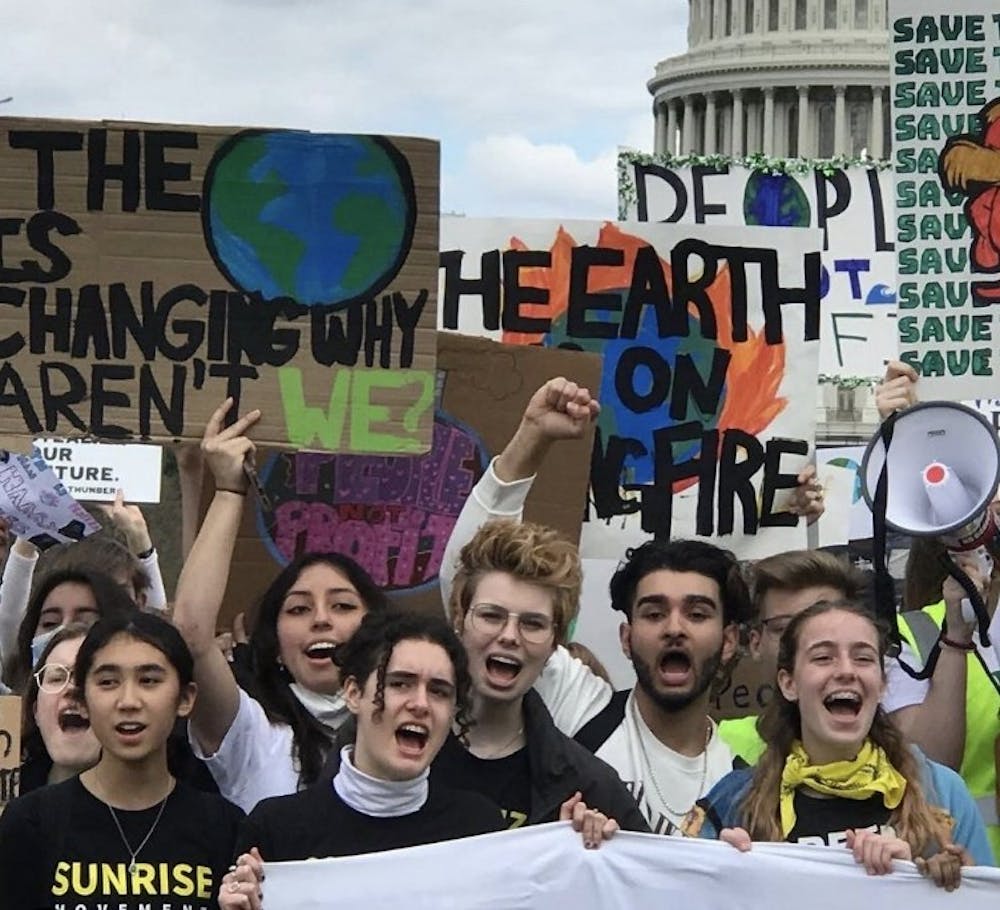On Sept. 29, the University released a statement announcing it would dissociate from 90 fossil fuel companies. The announcement came only a few days after Divest Princeton’s first protest of the year, held on Sept. 23 as part of the Global Climate Strike. The announcement left many longtime Divest activists feeling invigorated as they looked towards the future of climate activism on campus.
A key part of that future? First-year students, who had only been on campus for a few weeks before the University’s announcement. In spite of the short timeframe, many of these students had already gotten involved in Divest Princeton. Some, like Eleanor Clemans-Cope ’26, were even giving speeches at the Sept. 23 protest.
“I am Eleanor Clemans-Cope, I am a first-year student, and like all of you, I am sick and tired of Princeton's support for fossil fuel companies and the active destruction of our planet,” she shouted over the wind.
Clemans-Cope is a contributing opinion columnist for The Daily Princetonian.
It didn’t take long for these first years to get involved — leading songs, organizing their peers, and giving speeches demanding that the University divest from fossil fuels. For many of them, joining Divest Princeton was only the latest step in a long-standing commitment to climate activism. Now, members of the Class of 2026 are bringing past experience with local and national organizing to the table and lending fresh energy to campus advocacy.
For Davi Frank ’26, getting involved with Divest Princeton felt like a natural next step.
“I have done a good amount of climate activism before. I was the head of my school’s environmental club, and I organized through Sunrise [Movement] and Youth Climate Movement at various times,” Frank reflected.

Alexander Norbrook ’26 at a protest. The photo was taken by his father, David Norbrook.
Photo courtesy of Alexander Norbrook ’26.
Alexander Norbrook ’26 described his own experience with the Sunrise Movement as “transformative,” despite the restrictions of COVID-19 protocols throughout his involvement.
“When I was in high school, I saw the most urgent and most effective way of making a difference to be at a statewide level in Maryland, and in the city of Baltimore,” Norbrook reflected. “[In Sunrise Baltimore] there’s a lot of national resources and national support, and also national coalition organizing.”

Norbrook, like Clemans-Cope, reached out to Divest Princeton this past summer, hoping to get involved with the organization’s efforts.
“We welcomed them with open arms,” said Divest Princeton co-coordinator Aaron Serianni ’25.
Beyond Divest Princeton, Norbrook hopes to join other on-campus groups that promote climate activism.
“I plan on joining some sustainability policy organizations, and also the garden club … [where I can] put myself in a relationship with nature in perhaps a more literal and reciprocal kind of way,” Norbrook said.
Many of these first-year students noted that involvement in climate activism at Princeton required them to adjust their mindsets about what organizing and protesting look like.
When asked about the differences between high school and college organizing, Frank said, “In high school organizing, you had to comply a lot more with high school rules, and in college organizing you kind of just do it … at large, you have a lot more freedom.”
Many of the “high school rules” Frank referenced present enormous challenges to students who wish to stage protests. Walkouts, a common form of student activism, often violate school policies, and many students thus risk suspension or disciplinary consequences by partaking in them. In college, however, students often have far more freedom in missing classes, expressing their beliefs, and seeking support among their professors and their peers.

Davi Frank ’26 (third from right, holding a white sign) at a climate protest.
Photo courtesy of Davi Frank ’26
Other students commented on the shift in specific goals of climate activism in the transition from high school to college. Those involved in Sunrise noted that their past experiences related to climate policy on a broader level, whereas coming to the University meant feeling like they have to shift toward a focus on divestment.
“[For Sunrise Baltimore,] the horizon is broader because it’s all climate policy, rather than Divest, which is more focused and can be more confrontational,” Norbrook said. “I think the goal of Sunrise versus Divest is very different. Divest is a climate justice organization, and it works beyond just divestment, but primarily, its goal is to get Princeton to take all its money out of fossil fuels and dissociate from them completely.”
Returning students noted the importance of getting first-years involved in activist movements at the University. Serianni, speaking on behalf of Divest Princeton, emphasized the group’s goals to create a cohort of students from all parts of the Princeton community.
“[First-years] will be here for four years. [Divest] will be here much longer than Princeton thinks we will be. Continuity is essential for Divest Princeton to have long-lasting change,” Serianni said.
Equipped with lessons learned in their previous efforts, these first-years have specific tactics they hope to deploy during their time here.
Frank, for instance, is hoping to create a climate alliance group within the Center for Jewish Life (CJL). Frank and another first-year, Raphaela Gold ’26, have already garnered support on campus for this group, which would function as an offshoot of the Jewish Youth Climate Movement. Frank and Gold hope to promote sustainability through a variety of initiatives, including cleaning up waste around Lake Carnegie, implementing composting in the dining hall, and creating a Climate Action plan for the CJL.
Gold is a Features contributor for the ‘Prince.’
“I think this issue [of divestment and climate activism] is an issue that applies to every single student at this University,” Frank said, “even if they aren’t the people writing reports, organizing activism, or being activists. It’s something they should deeply care about and take action on.”

Eleanor Clemans-Cope ’26 participating in civil disobedience. The photo was taken by her grandmother, Holly Clemans.
Photo courtesy of Eleanor Clemans-Cope ’26.
Clemans-Cope hopes to get her message out through “disruptive activism.” She noted that she had previously been arrested twice in acts of civil disobedience while protesting for action on climate change.
“I’m committed to disruptive activism. I believe that in all civil rights movements, and all justice movements, disruptive activism is a critical piece of the puzzle,” Clemans-Cope said. “I myself have been arrested twice for climate related civil disobedience. So things like [protests], this is what we do in order to get our message out and to get politicians listening to us and to get people into the movement.”
Norbrook echoed her sentiments, saying he’s “excited to be a more disruptive voice and presence” as part of Divest Princeton.
After the University's Sept. 29 announcement, these first-years said they were left energized — ready to continue the fight, and to get more creative with their methods for doing so.
“The main takeaway from [the announcement] is that activism works. As Frederick Douglass said, ‘power concedes nothing without demand,’” Clemans-Cope wrote in a statement to the ‘Prince’ following the announcement. “Divest Princeton and our allies will continue to make good trouble, because making good trouble is how you get good things done.”
Sophie Glaser is a news and features contributor, as well as a copy editor for the ‘Prince,’ she can be reached at sglaser@princeton.edu or @SophieMGlaser on Twitter.
Head Podcast Editor Hope Perry also contributed reporting.








